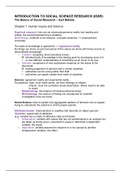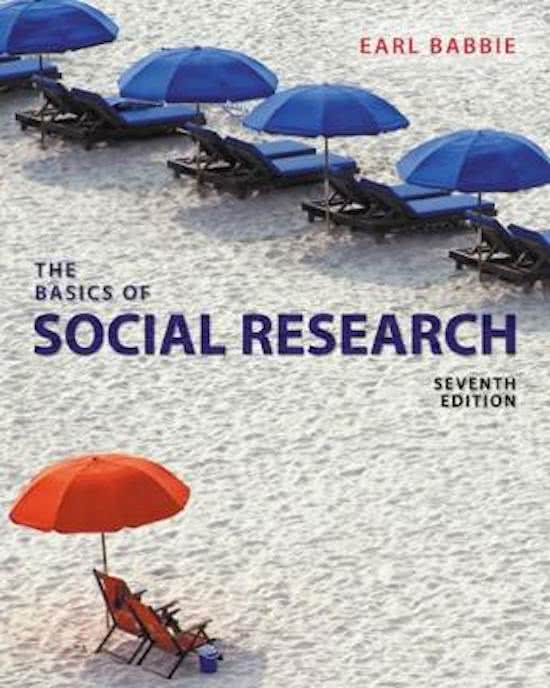INTRODUCTION TO SOCIAL SCIENCE RESEARCH (ISSR)
The Basics of Social Research – Earl Babbie
Chapter 1. Human inquiry and Science
Empirical research: how can we observe/experience reality (not reading and
writing, but examining/observing a situation)
Methodology: methods to do research, concepts (abstract) --> measurement
(concrete)
The basis of knowledge is agreement --> Agreement reality:
the things we ‘know’ as part and parcel of the culture we share with those around us
(secondhand knowledge)
Tradition: accepting ‘what everybody knows’
inherited body of knowledge is the starting point for developing more of it
no new different understanding of something we all ‘know’ to be true
Authority: acceptance of new acquisitions depends on the status of the
discoverer
trusting judgement of persons with a certain expertise
authorities can be wrong within their field
authorities can speak outside their realm of expertise
Science: agreement reality and experiential reality,
Foundations: logic; must make sense, not from ideology or religion
empiric; must not contradict actual observation, others need to be able
to check
- Epistemology: the science of knowing (what we know)
- Methodology: the science of finding out: procedures for scientific
investigation (how we know)
Social Science: tries to explain why aggregated patterns of behavior are so regular;
trying to understand the systems in which people operate
Attributes/values: characteristics or qualities that describe an object (person)
Variables: logical sets of attributes
(e.g. variable sex is made of attributes male and female)
Independent: variable with values that are not problematical in an analysis but
are taken as simply given. presumed to cause or determine a dependent
variable. the cause
Dependent: variable assumed to depend on or be caused by another
(independent variable). the effect
,Major aspects of the scientific enterprise:
I. Theoretical concept: a (social) phenomenon that is considered relevant to
study, logic, conceptualization (translating topic into concept)
Theory = coherent explanation of one or more concepts and their relations
= systematic explanation for the observation that relate to a
particular aspect of life
Can only be tested by agreed-on criteria
II. Data collection; observation
From abstract to concrete: experiments, surveys, content analysis, online
ethnography
III. Data analysis; patterns in what is observed and comparison with logical
expectations
Placed in a context of knowledge and understanding, our ability to predict future
circumstances improves
Errors in inquiry
- Inaccurate observations
- Overgeneralization, on the basis of limited observations,
solved by replication: repeating an experiment to expose or reduce error
- Selective observation: ignoring cases that do not fit the pattern of
overgeneralized conclusions
- Illogical reasoning: ‘the exception proves the rule, ‘gambler’s fallacy’
Objections to social regularities
- The charge of triviality: the obvious all too often turns out to be wrong
- Exceptions: social regularities are probabilistic patterns (which tell us what is
most likely)
- Human interference: conscious will to upset observed social regularities,
recursive; what we learn about society can end up changing things so that
what we learned is no longer true
, Induction: the logical model in which general principles are developed from specific
observations (specific --> general), discovering a pattern if there is hardly any theory,
creating your own theory
Idiographic explanation (idio: unique, separate, peculiar)
An approach to explanation in which we seek to exhaust the idiosyncratic
causes of a particular condition or event, more space for individual cases,
detailed information, closer to ‘reality’ , based on a case study, small-level
Qualitative methods (nonnumerical/words), often seeks for in depth
explanations, interviews
Deduction: the logical model in which specific expectations or hypotheses are
developed on the basis of general principle (general --> specific), building on what we
know already/testing theory, looking for circumstances or instances to prove it
Nomothetic explanation: an approach to explanation in which we seek to
identify a few causal factors that generally impact a class of conditions or
events, patterns, based on a general case
Quantitative methods (numerical), rather employs numbers, works deductive,
surveys
Model: simplified depiction of reality: two concepts and relation, observation
Hypothesis: specified testable expectation of empirical reality, something that ought
to be observed in the real world if the theory is correct
How to observe scientifically:
- Be objective; don’t be biased
- Be precise; be focused, pay attention to details, define/explain
- Be systematic; follow certain procedures, replication
- Be reflective;






